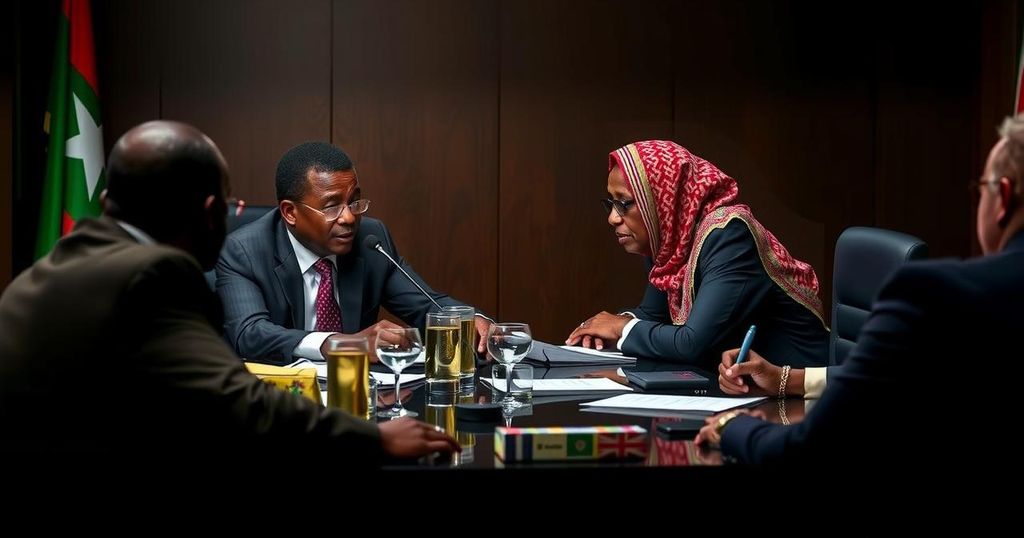El Burhan’s Diplomatic Visit to South Sudan: Addressing Critical Issues

Lieutenant General Abdel Fattah El Burhan, President of Sudan’s Sovereignty Council, visited South Sudan to address critical bilateral issues, marking his third official visit amid ongoing conflicts between Sudan’s SAF and RSF. Key topics included military escalations near the border, challenges in oil exports, and political tensions influencing South Sudan’s leadership dynamics.
Lieutenant General Abdel Fattah El Burhan, the President of Sudan’s Sovereignty Council, recently traveled to Juba, the capital of South Sudan, for discussions addressing four critical issues impacting the bilateral relations between the two nations. This marks El Burhan’s third official visit since the onset of conflict between the Sudanese Armed Forces (SAF) and the Rapid Support Forces (RSF) that began in April of the previous year. Upon his arrival, he was welcomed by South Sudan’s President Salva Kiir Mayardit, alongside key members of the Sudanese diplomatic mission.
The delegation accompanying El Burhan included high-ranking officials such as the Minister of Energy and Oil and the Undersecretary of Foreign Affairs. As reported by South Sudanese journalist Ateem Simon, this visit was executed without prior announcement. Discussions are purportedly focusing on significant challenges, including the increasing military tensions near the Sudan-South Sudan border, particularly in regions like Babnis and the oil-rich Heglig area,
which both countries claim but is administered by Sudan.
Additionally, a key agenda item concerns the pipeline facilitating South Sudan’s crude oil exports to the Bashayer Port in Red Sea state, which has been halted due to technical difficulties. South Sudanese authorities reported losses of approximately $100 million each month due to interruptions in oil exports since February, as oil constitutes over 90 percent of their government revenue. There have also been concerns regarding security issues that might be impeding the resumption of oil transportation.
El Burhan’s visit is also crucial following comments by Taban Deng Gai, a vice president in South Sudan, implying the absence of a functional government in Sudan, coupled with urgent economic and humanitarian crises in the contested Abyei region. This statement was clarified by the South Sudanese government as a personal view of the vice president. Significantly, El Burhan is recognized as the guarantor of the South Sudan Peace Agreement, and his visit may seek to address ongoing tensions within the factions involved in the peace process, particularly those relating to the South Sudan Opposition Alliance (SSOA). The historical context of Sudan and South Sudan’s complex relationship adds urgency to these discussions, as both countries navigate the ramifications of prolonged instability.
The context surrounding Lieutenant General Abdel Fattah El Burhan’s visit to South Sudan lies in the ongoing conflict within Sudan between the SAF and RSF, which has caused significant instability since April of last year. This precarious situation has exacerbated existing tensions in South Sudan, which gained independence from Sudan in 2011. The economic implications are particularly noteworthy, as South Sudan heavily relies on oil exports via pipelines through Sudan, creating a delicate dependency that intertwines their respective economies and political relations. The potential changes in the leadership of South Sudanese parties also underscore the influence of Sudan in South Sudan’s political landscape.
In conclusion, Lieutenant General Abdel Fattah El Burhan’s visit to South Sudan highlights the complex interplay of political and economic factors influencing the relationship between the two countries. As discussions revolve around critical issues such as military escalations, oil exports, and political leadership, the need for resolution is pressing in light of the ongoing challenges both nations face. The visit serves as a reminder of Sudan’s pivotal role in South Sudan’s governance and stability, underscoring the historical ties that continue to shape their interactions.
Original Source: www.dabangasudan.org








